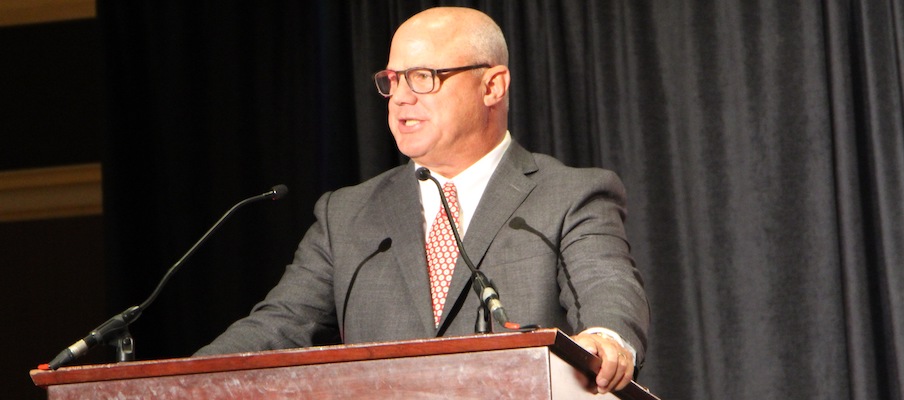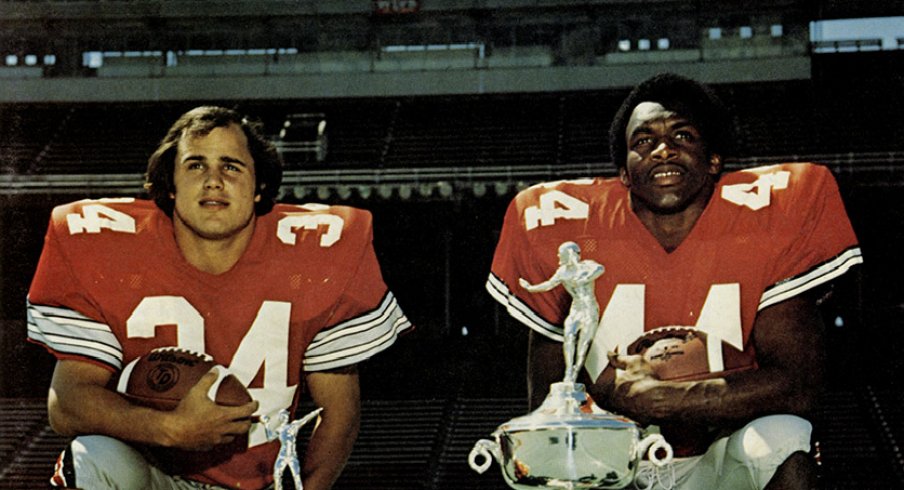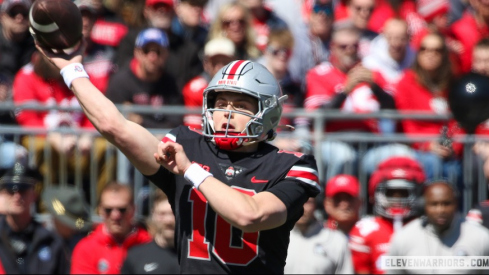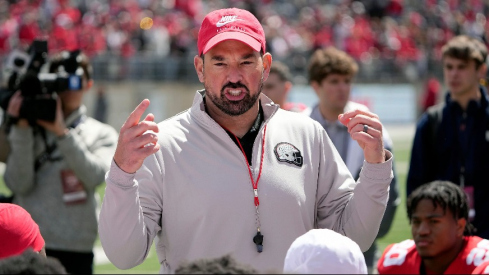Where Are They Now is a weekly series where we catch up with former Buckeyes to discuss their Ohio State experience and beyond.
Following in the footsteps of two-time Heisman Trophy winner Archie Griffin, former running back Jeff Logan faced high expectations coming into his junior year at Ohio State. He rushed for 1,248 yards in his junior season and totaled 2,026 yards over his career. Coached by Woody Hayes from 1974-1977, he ended his career with the Buckeyes as a captain, four-time Big Ten Conference Champion, and with two wins over Michigan.
I had the opportunity to chat with him to discuss his legacy, his professional life, and how he continues to pay it forward.
You and your dad both were coached under Woody Hayes, correct?
JL: Yeah, we're one of only two father-son combinations in the history of Ohio State football to ever play for Coach Hayes and the other was a teammate of my dad who went on to win the Heisman Trophy, Hop [Howard] Cassidy, and his son Craig Cassidy, who was a defensive back when I was playing. So we've got kind of a unique story to be able to tell there.
What was it like to be coached by Woody Hayes?
JL: It wasn't overwhelming for me because I kind of grew up knowing Woody because of my dad's relationship with him. So it wasn't that I had this awestruck feeling about going in front of Woody for the very first time like a lot of the guys that are recruited that didn't have that previous relationship because of my father. But it was clearly driven more by respect and really the privilege I think is probably the best way for me to put it of being able to play for the man and be able to play for the institution.
What is your favorite memory from your football career?
JL: Well if you're talking to any former player, they will tell you, if they have the chance to, that wins over the team up North are your greatest memory ever and we had two of those and so the two pairs of gold pants are obviously special. Two other things that probably stand out: one was the very first Rose Bowl that I was able to play in because of what the Rose Bowl means and what that's all about.
Second would have been the very first game that I started which was the opening game of my junior seasons in '76 against Michigan State and you know there was concern because I was replacing the two-time Heisman Trophy winner. I was concerned that there would be the life after Archie and I ended up having - and our team ended up having - a terrific day in-game against Michigan State, that first game so I'll certainly remember my first start as being pretty special as well.
What have you been up to since stepping away from football?
JL: I was very fortunate when I got done playing, and this was before it became cool to kind of go into the media, but I started doing some color commentary on high school and college football while I was getting started as a financial planner and that's what I have been doing in my day job, if you will, since 1980.
I was drafted by the Baltimore Colts, they were in Baltimore at the time not in Indianapolis, and I was with them through training camp and by mutual agreement, it was time just to move on and get a real job. I got into the financial planning business and have been a financial advisor ever since. But getting involved in the broadcasting part of things, like I did back then, early on it created ongoing opportunities where I've had a chance to work with the Ohio State football radio network for a number of years and now I'm doing work with 610 WTVN with their coverage of Ohio State football during the fall and some high school football on the CW on Thursday nights and all of that has been really cool.
The other thing that I got involved in that I think is important is that I was invited to be a board member and eventually served as a president of the Varsity O Alumni Association and that's the letter winner Association for all sports at Ohio State, men's and women's. So the ten or twelve years I spent on that board really gave me an opportunity to really get involved in making sure that the athletes were given as much support as possible in transitioning from playing the game or whatever their sport was to finding that next career. And while everybody thinks they're going to play professionally at whatever their sport might be, the fact of the matter is, most of us end up having to do real jobs and so that's one of the things that we really concentrated on when I was a member of the Varsity O board.
We came up with the tagline that we eventually trademarked that you see in every facility that Ohio state has. It's called "athletes helping athletes" and that was trademarked during our time on the board and we believe it's more than just words on a sign. We believe that it really is an important part of what our generation, any of those guys or gals that have left have a responsibility to help transition those other young people that are coming out and we hope that they feel the same way when they finish their playing days.
You've been very involved with Ohio State since you left school but what made you want to stick around?
JL: You know the Alumni Association I continue to volunteer to work with them and their speaker series and travel all over the country on behalf of them. But what kept me here was, whether it's right or wrong, if you play for Ohio State at any level of any sport, I believe that you have the ability to leverage that into a great career in the city of Columbus or in central Ohio.
That was certainly true of me. I was getting started in my business and it certainly helped that I had a recognizable name in the community because of football. It opened doors but it didn't ever close any for me either and I had to perform at the same high level in business that I did on the field if I was going to be accepted and do the things that I needed to be able to do and succeed. Staying in Columbus and staying here was an easy decision for me because of the footprint that Ohio State athletics has in this community.

Tell me about the Logan Family Foundation.
JL: We started the Logan Family Foundation about 15 or 16 years ago and there are four boys in our family and my sister Amy. My brother Jud, who is the second boy in the family, was a four-time Olympian for the United States Olympic team in the hammer throw and he is currently the head track and field coach of Ashland University up north of here near Mansfield.
Judd and I were always going out and trying to help other people raise money for a variety of different charities, which we loved being able to do, but we thought that we could kind of pool our resources and the people that we knew and try and raise some money. What we wanted to do was to start to pay it forward which is obviously something that you're familiar with if you know anything about Woody Hayes and Ohio State football.
We were raised that way by our parents and certainly, Woody Hayes had an impact on all of us in that direction but we decided that we would concentrate on trying to raise money to help children and families in the community which we grew up in, which was the Canton area of Ohio Stark County, and also where we live today.
We still have family in Stark County but Judd is in Ashland, I'm in Columbus and so since that time 16 years ago, we have raised and delivered in excess of $600,000 in contributions to various charities and organizations that help families and children in the communities that we either grew up in or where we live today. So that's what that's all about. We do it with an annual golf outing and a variety of different things that we do and we've got great sponsors and former players come back and help us a bunch when we do this thing and it's absolutely been terrific.
How would you say that your football career has prepared you for life after football?
JL: In order to succeed in football at the level that I played at and others have had the opportunity to, you have to have an unbelievable commitment to excellence and do whatever it takes to be able to achieve your goals. The great sport of football, I think, teaches a lot of life lessons that translate beyond touchdowns and running the ball, blocking, and tackling and all that good stuff, but it does teach a dedication and teaches you hard work and that you can get paid, and you can have a career in direct proportion to your commitment to excellence.
So I took what I learned in football because there was a whole lot of doubters that thought I would never be able to achieve anything because you're either too small to be able to play or you came from not a big enough high school program or whatever it might be and I wasn't going to let that stop me. I went ahead and achieved what I wanted to do. The same thing in business I've had certain business goals and family goals and I'm blessed to be able to have a terrific family.
I married a girl from high school who came to Ohio State. She ended up being a cheerleader for Ohio State for three years, we've got two great kids and now our first grandchild was born back in December so you know I've got more blessings than I deserve in this stage, but I'm going to keep working because they keep coming my way.


